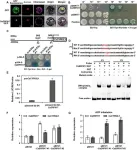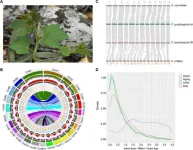(Press-News.org) A new Carnegie Mellon University study shows that many people with autism embrace ChatGPT and similar artificial intelligence tools for help and advice as they confront problems in their workplaces.
But the research team, led by the School of Computer Science's Andrew Begel, also found that such systems sometimes dispense questionable advice. And controversy remains within the autism community as to whether this use of chatbots is even a good idea.
"What we found is there are people with autism who are already using ChatGPT to ask questions that we think ChatGPT is partly well-suited and partly poorly suited for," said Begel, an associate professor in the Software and Societal Systems Department and the Human-Computer Interaction Institute. "For instance, they might ask: 'How do I make friends at work?'"
Begel heads the VariAbility Lab, which seeks to develop workplaces where all people, including those with disabilities and who are neurodivergent, can successfully work together. Unemployment and underemployment are problems for as many as nine out of 10 adults with autism, and many workplaces don't have the resources to help employees with autism and their coworkers overcome social or communication problems as they arise.
To better understand how large language models (LLMs) could be used to address this shortcoming, Begel and his team recruited 11 people with autism to test online advice from two sources — a chatbot based on OpenAI's GPT-4 and what looked to the participants like a second chatbot but was really a human career counselor.
Somewhat surprisingly, the users overwhelmingly preferred the real chatbot to the disguised counselor. It's not that the chatbot gave better advice, Begel said, but rather the way it dispensed that advice.
"The participants prioritized getting quick and easy-to-digest answers," Begel said.
The chatbot provided answers that were black and white, without a lot of subtlety and usually in the form of bullets. The counselor, by contrast, often asked questions about what the user wanted to do or why they wanted to do it. Most users preferred not to engage in such back-and-forth, Begel said.
Participants liked the concept of a chatbot. One explained: "I think, honestly, with my workplace … it's the only thing I trust because not every company or business is inclusive."
But when a professional who specializes in supporting job seekers with autism evaluated the answers, she found that some of the LLM's answers weren't helpful. For instance, when one user asked for advice on making friends, the chatbot suggested the user just walk up to people and start talking with them. The problem, of course, is that a person with autism usually doesn't feel comfortable doing that, Begel said.
Results from the experiment were presented by first author and HCII Ph.D. student JiWoong (Joon) Jang at the Association for Computing Machinery's Conference on Human Factors in Computing Systems (CHI 2024) last month in Honolulu. In addition to Begel and Jang, co-authors include HCII Ph.D. student Sanika Moharana and Patrick Carrington, an assistant professor in the HCII.
It's possible that a chatbot trained specifically to address the problems of people with autism might be able to avoid dispensing bad advice, but not everyone in the autism community is likely to embrace it, Begel said. While some might see it as a practical tool for supporting autistic workers, others see it as yet another instance of expecting people whose brains work a bit differently than most people to accommodate everyone else.
"There's this huge debate over whose perspectives we privilege when we build technology without talking to people. Is this privileging the neurotypical perspective of 'This is how I want people with autism to behave in front of me?' Or is it privileging the person with autism's wishes that 'I want to behave the way I am,' or 'I want to get along and make sure others like me and don't hate me?'"
At heart, it's a question of whether people with autism are given a say in research that is intended to help them. It's also an issue explored in another CHI paper, on which Begel is a co-author with Naba Rizvi and other researchers at the University of California, San Diego. In that study, researchers analyzed 142 papers published between 2016 and 2020 on developing robots to help people with autism. They found that 90% of this human-robot interaction research did not include the perspectives of people with autism. One result, Begel said, was the development of a lot of assistive technology that people with autism didn't necessarily want, while some of their needs went unaddressed.
"We noticed, for instance, that most of the interactive robots designed for people with autism were nonhuman, such as dinosaurs or dogs," Begel said. "Are people with autism so deficient in their own humanity that they don't deserve humanoid robots?"
Technology can certainly contribute to a better understanding of how people with and without autism interact. For instance, Begel is collaborating with colleagues at the University of Maryland on a project using AI to analyze conversations between these two groups. The AI can help identify gaps in understanding by either or both of the speakers that could result in jokes falling flat or creating the perception that someone is being dishonest. Technology could also help speakers prevent or repair these conversational problems, Begel said, and the researchers are seeking input from a large group of people with autism to get their opinion on the kind of help they would like to see.
"We've built a video calling tool to which we've attached this AI," said Begel, who has also developed an Autism Advisory Board to ensure that people with autism have a say in which projects his lab should pursue. "One possible intervention might be a button on this tool that says 'Sorry, I didn't hear you. Can you please repeat your question?' when I don't feel like saying that out loud. Or maybe there's a button that says, 'I don't understand.' Or even a tool that could summarize the meeting agenda so you can help orient your teammates when you say, 'I'd like to go back to the first topic we spoke about.'"
END
People with autism turn to ChatGPT for advice on workplace issues
Carnegie Mellon University research asks whether that use of AI makes sense
2024-06-06
ELSE PRESS RELEASES FROM THIS DATE:
How do you know where a fish goes?
2024-06-06
When scientists want to study the long-distance movement of marine animals, they will instrument them with a small device called an acoustic transmitter – or tag – which emits unique signals or “pings.” These signals are picked up by receivers anchored to the seafloor that record the date and time of each detection when the tagged animal comes within range.
Data collected by the receivers are stored until they are retrieved by researchers and shared across members of cooperative acoustic telemetry networks. This information provides valuable insights into animal behavior, migration patterns, habitat preferences and ecosystem dynamics – all of which ...
People feel more connected to “tweezer-like” bionic tools that don’t resemble human hands
2024-06-06
Some say the next step in human evolution will be the integration of technology with flesh. Now, researchers have used virtual reality to test whether humans can feel embodiment—the sense that something is part of one’s body—toward prosthetic “hands” that resemble a pair of tweezers. They report June 6 in the journal iScience that participants felt an equal degree of embodiment for the tweezer-hands and were also faster and more accurate in completing motor tasks in virtual reality than when they were equipped with a virtual human hand.
“For our ...
Physical activity, cardiovascular status, mortality, and prediabetes in Hispanic and non-Hispanic adults
2024-06-06
About The Study: In this cohort study of U.S. Hispanic or Latino and non-Hispanic adults, lower moderate to vigorous physical activity levels were associated with cardiovascular disease or mortality among participants with normoglycemia but not participants with prediabetes. Adults with prediabetes may benefit from reducing sedentary behavior and improving multiple lifestyle factors beyond improving moderate to vigorous physical activity alone.
Corresponding Author: To contact the corresponding author, Robert C. Kaplan, Ph.D., email robert.kaplan@einsteinmed.edu.
To ...
Heavy lifetime cannabis use and mortality by sex
2024-06-06
About The Study: A positive association between cardiovascular disease mortality and heavy lifetime cannabis use was observed among females in this study. Longitudinal studies are needed in general populations to investigate the potential effects of cannabis on mortality.
Corresponding Author: To contact the corresponding author, Alexandre Vallee, M.D., Ph.D., email al.vallee@hopital-foch.com.
To access the embargoed study: Visit our For The Media website at this link https://media.jamanetwork.com/
(doi:10.1001/jamanetworkopen.2024.15227)
Editor’s Note: Please see the article for additional information, ...
The rise of horse power ~4,200 years ago
2024-06-06
1. An international research team sequenced the genomes of hundreds of horse archaeological remains to track the historical rise of horse-based mobility around 4200 years ago in the Pontic-Caspian steppes.
2. The emergence of improved breeding techniques at the time considerably enhanced the yearly capacity of horse production, which helped spreading domestic horses like a wildfire across the whole Eurasian continent.
3. The massive human migrations that spread Indo-European languages outside the steppes around 5,000 years ago were not mediated by horses, contrarily to what was previously thought.
All domestic horses living on the planet today, whether racetrack ...
Adding nurse case managers to telehealth significantly lowers blood pressure in Black and Hispanic stroke survivors
2024-06-06
Low-income Black and Hispanic stroke survivors with uncontrolled hypertension had a more than two-fold reduction in blood pressure when they tracked it at home and sent their readings to a nurse case manager. The gains were in systolic blood pressure specifically at one year into the study and when compared to a similar group of patients who did not have access to a nurse.
Led by researchers at NYU Langone, the study is the first to examine differences in home blood pressure monitoring with or without nurse case management. Further, the findings, published online June 6 in the Journal of the American Medical Association (JAMA), addressed controlling hypertension in low-income ...
The gut’s stem cells get a new identity
2024-06-06
Two independent studies by Columbia scientists suggest that research into the gut’s stem cells over the past 15 years has been marred by a case of mistaken identity: Scientists have been studying the wrong cell.
Both studies were published online today in the journal Cell.
The gut’s stem cells are some of the hardest-working stem cells in the body. They work continuously throughout our lives to replenish the short-lived cells that line our intestines. About every four days, these cells—covering a surface about the size of a tennis court—are completely replaced.
Understanding these workaholic stem cells could help scientists turn ...
The World Cultural Council (WCC) is pleased to announce the names of the 2024 Awards
2024-06-06
SCIENCE
Professor Eske Willerslev, Professor of Evolutionary Biology at the University of Copenhagen and Prince Philip Professor at the University of Cambridge, has been selected as the winner of the Albert Einstein World Award of Science 2024.
The prize is granted in recognition of the numerous breakthroughs in evolutionary genetics Prof. Willerslev’s has made during his highly fruitful career. The award recognizes his pioneering contributions in establishing the field of Environmental DNA and the sequencing of ancient DNA to track the origins and interactions of human population groups.
During his doctoral studies, Prof. Willerslev published ...
Citrus saviors: discovering the genetic defense against Huanglongbing disease
2024-06-06
A recent study has pinpointed two key enzymes in Citrus sinensis that play a crucial role in the plant's defense mechanism against the Asian citrus psyllid (ACP), a vector for the lethal huanglongbing (HLB) disease. This research offers a promising lead in the battle against a disease that has caused significant losses in the citrus industry.
The citrus industry faces major challenges from Huanglongbing (HLB) disease, transmitted by the Asian citrus psyllid (ACP). Traditional control methods are often ineffective and environmentally harmful. The need for innovative and sustainable pest management strategies is ...
Desert hero unveiled: Cissus quadrangularis genome decodes drought survival tactics
2024-06-06
In a recent study, scientists have unlocked the genetic secrets of Cissus quadrangularis, a plant that flourishes in the harshest of desert climates. The discovery of its adaptive traits and the Crassulacean acid metabolism (CAM) pathway marks a significant leap forward in the quest for drought-resistant crops.
As water scarcity looms as a major threat to global ecosystems and food production, the quest to understand how plants like Cissus quadrangularis conquer arid landscapes is more critical than ever. The genetic blueprint of such species could hold the key to enhancing ...
LAST 30 PRESS RELEASES:
Effectiveness of exercise to ease osteoarthritis symptoms likely minimal and transient
Cost of copper must rise double to meet basic copper needs
A gel for wounds that won’t heal
Iron, carbon, and the art of toxic cleanup
Organic soil amendments work together to help sandy soils hold water longer, study finds
Hidden carbon in mangrove soils may play a larger role in climate regulation than previously thought
Weight-loss wonder pills prompt scrutiny of key ingredient
Nonprofit leader Diane Dodge to receive 2026 Penn Nursing Renfield Foundation Award for Global Women’s Health
Maternal smoking during pregnancy may be linked to higher blood pressure in children, NIH study finds
New Lund model aims to shorten the path to life-saving cell and gene therapies
Researchers create ultra-stretchable, liquid-repellent materials via laser ablation
Combining AI with OCT shows potential for detecting lipid-rich plaques in coronary arteries
SeaCast revolutionizes Mediterranean Sea forecasting with AI-powered speed and accuracy
JMIR Publications’ JMIR Bioinformatics and Biotechnology invites submissions on Bridging Data, AI, and Innovation to Transform Health
Honey bees navigate more precisely than previously thought
Air pollution may directly contribute to Alzheimer’s disease
Study finds early imaging after pediatric UTIs may do more harm than good
UC San Diego Health joins national research for maternal-fetal care
New biomarker predicts chemotherapy response in triple-negative breast cancer
Treatment algorithms featured in Brain Trauma Foundation’s update of guidelines for care of patients with penetrating traumatic brain injury
Over 40% of musicians experience tinnitus; hearing loss and hyperacusis also significantly elevated
Artificial intelligence predicts colorectal cancer risk in ulcerative colitis patients
Mayo Clinic installs first magnetic nanoparticle hyperthermia system for cancer research in the US
Calibr-Skaggs and Kainomyx launch collaboration to pioneer novel malaria treatments
JAX-NYSCF Collaborative and GSK announce collaboration to advance translational models for neurodegenerative disease research
Classifying pediatric brain tumors by liquid biopsy using artificial intelligence
Insilico Medicine initiates AI driven collaboration with leading global cancer center to identify novel targets for gastroesophageal cancers
Immunotherapy plus chemotherapy before surgery shows promise for pancreatic cancer
A “smart fluid” you can reconfigure with temperature
New research suggests myopia is driven by how we use our eyes indoors
[Press-News.org] People with autism turn to ChatGPT for advice on workplace issuesCarnegie Mellon University research asks whether that use of AI makes sense








